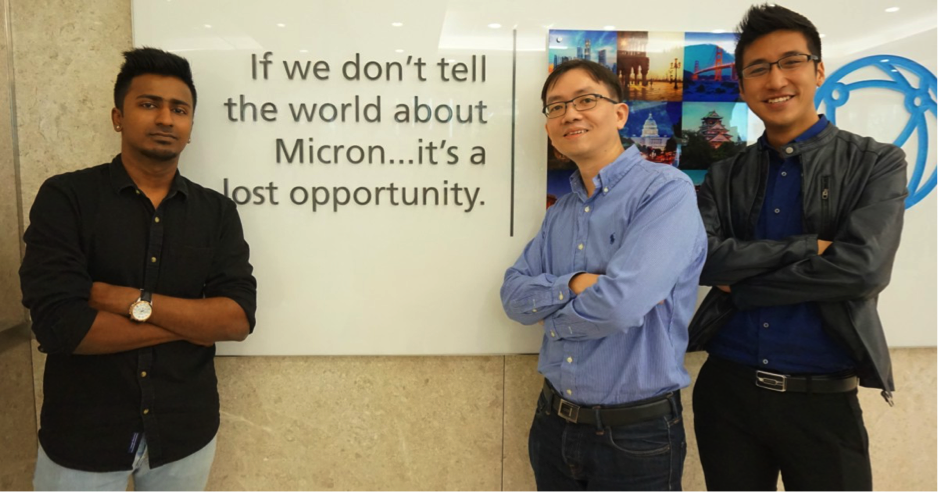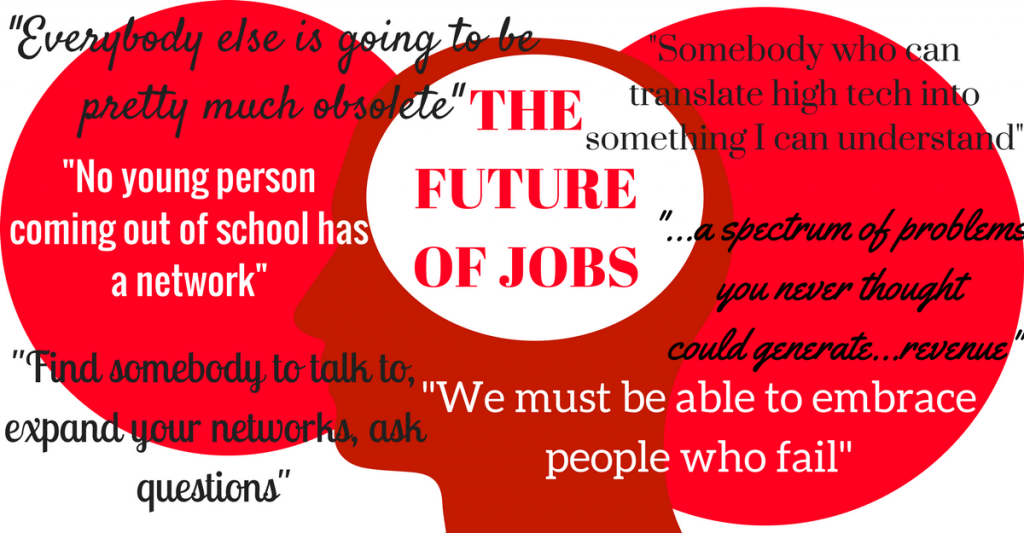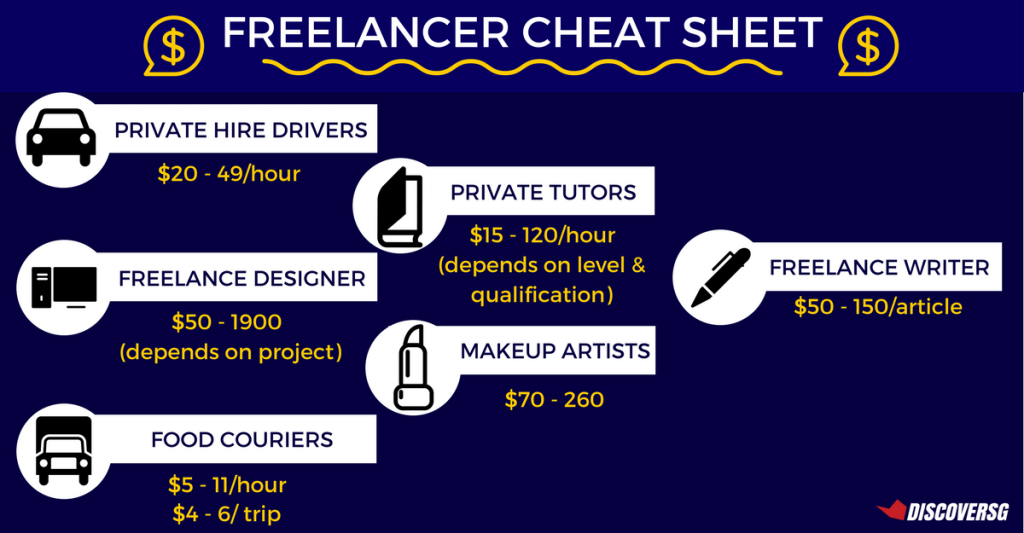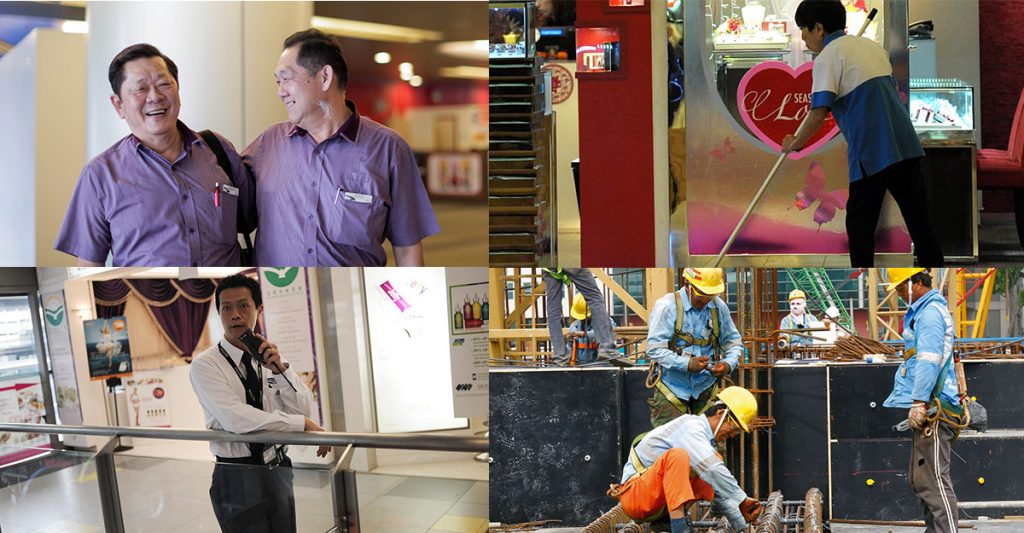Engineering Is The Future, And Why Their Workspaces Are Actually Really Appealing To Millennials

Tell someone you work in engineering, and chances are, they think you work with grease and machines parts.
It is not an inaccurate picture, but with the perpetuation of tech-dominance, engineering has evolved into a career of the future.
Looking past the engineering of yesteryear, the engineering profession today touts the use of big data and high-end technology while working in impressive workspaces guaranteed to drop your jaws.
Engineering = Bulletproof Job of the Future?
[caption id="attachment_26107" align="aligncenter" width="815"] Micron believes its employees are more than just staff / Image Credit: Samantha Tay / Vulcan Post[/caption]
Micron believes its employees are more than just staff / Image Credit: Samantha Tay / Vulcan Post[/caption]
The world today thrives on innovation. To maintain this inexorable forward thrust, the technology that supports cannot stagnate either. As such, the onus lies on engineers to not fall behind.
This is a harrowing thought indeed.
Micron data analyst Kegan Ang, who works with schematics, statistics and Big Data in the Planning Department (like a Central Command Centre), shared the perks of working for a company that provides extensive support for education.
Micron also partners with the local polytechnics to offer SkillsFuture Earn & Learn programmes for specialist diplomas. There are also in-house training programs that employees can participate in to up-skill themselves.
[caption id="attachment_26144" align="aligncenter" width="768"] Data Analyst Kegan Ang / Image Credit: Melissa Chan[/caption]
Data Analyst Kegan Ang / Image Credit: Melissa Chan[/caption]
To job-seeking millennials out there, on-the-job education comes as an attractive incentive. Financial support aside, these perks also create a workspace that nurtures its staff, as opposed to utilising them as human robots to meet ends.
And if we’re talking about bulletproof jobs, working in a sector upon which the future relies (since the Internet of Things cannot work without memory cards, which Micron manufactures) sounds like a pretty stable gig indeed.
With an invite to Micron, I visited Fab 10, one of their 4 semiconductor facilities, to personally take a look at the workspace of a modern day engineer.
Micron Technology, Inc
Micron Technology Inc. is one of the wafer fabrication companies in Singapore which produces a global supply of memory chips (even the ones in your HPB tracker watch).
This U.S. multi-national giant employs approximately 7,500 workers in Singapore, and hires staff from various disciplines within Engineering.
[caption id="attachment_26109" align="aligncenter" width="855"] Image Credit: Micron Technology Inc.[/caption]
Image Credit: Micron Technology Inc.[/caption]
In modern engineering, Kegan says that an engineer’s work is evolving into sophisticated, high tech work. So it’s not just about going out in the hot sun and getting sweaty and dirty.
For example, in Fab 10 clean rooms where memory chips are made, the room has to be free from random particles therefore, you cannot even tear paper in the room.
https://www.youtube.com/watch?v=EZJzLQJMdXs
Engineers have to smock-up as the air in the Fab 10 floor is highly controlled for foreign particles.
[caption id="attachment_26110" align="aligncenter" width="940"] Image Credit: Micron Technology Inc[/caption]
Image Credit: Micron Technology Inc[/caption]
To automate the transport of silicon wafers used to make memory chips, Front Opening Unified Pods (FOUPs) below are used.
Modern clean rooms are automated, with ceilings lined with tracks upon which the FOUPs travel.
[caption id="attachment_26111" align="aligncenter" width="404"] Image Credit: Micron Technology Inc[/caption]
Image Credit: Micron Technology Inc[/caption]
Kegan’s job involves monitoring the progress of the automated processes, which means he not only has to know how the processes work, but also analyses how to improve production time, and troubleshoots where necessary.
A Space To Break The Rules
[caption id="attachment_26112" align="aligncenter" width="940"] Image Credit: Micron Technology Inc[/caption]
Image Credit: Micron Technology Inc[/caption]
One aspect of engineering that used to put me off was the image of a ‘checklist’ work style, so imagine my surprise when I learnt about their “TED Talks”.
A platform for engineers to share ideas on how to improve systems, these talks also encourage engineers to trail-blaze new technology. Promising ideas are not swept under the rug and can actually be adapted and realised by the company.
For naysayers who think these conferences are limited to the more senior, scrap that thought. Kegan shared that despite being a new employee, he already had the chance to be on this stage of open-sharing (i.e. the “TED” talks) twice.
[caption id="attachment_26113" align="aligncenter" width="796"] Vignesh, Roger and Kegan of Micron / Image Credit: Micron Technology Inc[/caption]
Vignesh, Roger and Kegan of Micron / Image Credit: Micron Technology Inc[/caption]
Engineering Is Vital To Singapore’s Future
In recent years, Singapore has been championing more opportunities for further education in engineering, such as via the Workforce Skills Qualifications (WSQ) for various engineering skills and the Electronics and Precision and Machinery Engineering Cluster’s Place-and-Train Programmes.
[caption id="attachment_26114" align="aligncenter" width="938"] NTUC U Associate / Image Credit: NTUC[/caption]
NTUC U Associate / Image Credit: NTUC[/caption]
The Labour Movement has been expanding its U Associate network to include more than 40 professional guilds (termed U Associates) such as the Institution of Engineers, Singapore (IES), to develop training and progression opportunities for their professional members, such as the Engineers Progression pathway with a three-tiered scheme below.
[caption id="attachment_26145" align="aligncenter" width="524"] NTUC Engineers Progression Pathway / Image Credit: NTUC[/caption]
NTUC Engineers Progression Pathway / Image Credit: NTUC[/caption]
But despite the increasing prominence of engineering as a career, I admit to still having harboured a skewed perception of what modern engineering was like, before hearing about modern engineering jobs from Micron and one of its engineers, Kegan Ang.
Trashing stereotypes of unattractive, dead-end work cultures, what I learnt that day truly showed me the future.
The Labour Movement is working closely with tripartite partners (i.e. the government and businesses) to help working people into future jobs, such as those in sunrise industries like engineering.
Also Read, 5 Harsh Realities Of Working In S’pore You Won’t Want To Hear But Should
These 8 Soundbites Will Have You Rethinking About The ‘Future Of Jobs’ In Singapore

Being a millennial is no easy feat. We have to balance work, play and family all whilst answering life’s toughest question (“what am I doing with my life?!”). Truth of the matter is, most of us have or will go through a quarter-life crisis where we get pretty panic stricken on what we have achieved and where our future lies.
While questions about who we are and if our life is heading in the right direction can be pretty difficult to answer, we picked up some pretty good advice (and a wee bit of fortune telling) when we headed down to the ‘Future Of Jobs Discussion Panel’ earlier in the week.
[caption id="attachment_24796" align="alignnone" width="865"] Source: MP Desmond Choo’s Facebook[/caption]
Source: MP Desmond Choo’s Facebook[/caption]
The session, organised by Young NTUC, was aimed at equipping youth in navigating the job landscape as well as preparing them for the workplace of tomorrow by giving an insight into how it will evolve.
The panel discussion saw Labour chip in on discussions, giving their candid thoughts on how workers need to stay relevant and stay ahead.
[caption id="attachment_24797" align="alignnone" width="1000"] Speakers at ‘Future Of Jobs’ Panel[/caption]
Speakers at ‘Future Of Jobs’ Panel[/caption]
Here are some pretty insightful nuggets of wisdom we picked up:
- “In about 20 years’ time…jobs that are outside of making music or art are going to be computer programs. Everybody else is going to be pretty much obsolete “
– Pulkit Jaiswal
With disruptions abound, the job landscape in Singapore is ever evolving and becoming increasingly tech heavy. It certainly bodes well to mull over future prospects and continually upskill to be able to plug the gaps in the future economy.
If the recent Committee on the Future Economy report is anything to go by, Singapore is looking ahead to chart the next phase of growth and you definitely do not want to get left behind.
- “Even in very tech-heavy companies…what you really want to see from a good employee…is somebody who can translate high technology into something that I can understand”
– MP Desmond Choo
While we can’t argue that jobs in Singapore’s future are going to be more tech heavy, we still have to keep in mind that to climb the ranks at a company you have to establish soft skills.
In his recent Budget Debate speech, Labour MP Desmond Choo quipped that “being nimble and adaptable to change are the names of the new game.” Knowledge can be passed on but honing your soft skills will be what makes you more indispensable to the company.
[caption id="attachment_24798" align="alignnone" width="1024"] Technological advances[/caption]
Technological advances[/caption]
- “In my opinion, what is going to take off in the next 10 to 20 years is this thing I call GRAI. Genetics, robotics and AI technology. I believe that these fields will generate the most amount of revenue“
– Pulkit Jaiswal
No surprises that industries that will likely see a jump in revenue and investment are tech-heavy. With huge leaps in tech advancements such as self-driving cars, we will very likely continue to see tech companies and start-ups breaking new grounds. As Singapore charts the way forward, it is necessary for workers to “keep up” and harness this technology rather than be replaced by it.
- “As a society that promotes entrepreneurship, we must be able to embrace people who fail ”
– MP Baey Yam Keng
Aspiring entrepreneurs are a dime a dozen and while it may sound very tempting to start your own company (your own rules and you answer only to yourself!), it takes a variety of skills, a lot of grit and just a bit of luck. A lot of startups often see themselves shutting its doors even before taking off.
Failure isn’t an easy pill to swallow especially in a competitive country like Singapore. While we are becoming increasingly encouraging of innovation and
entrepreneurship, we also have to be mindful to embrace failure as well.
- “If you’re starting a business… go out of Singapore and work for a startup… When you’re in Singapore… it’s very easy to get trapped solving very specific problems but when you go out… you’ll actually see a spectrum of problems you never thought could generate not only jobs but revenue”
– Pulkit Jaiswal
“Go forth, see the world, conquer the world” so that we can gain experience and exposure – two attributes that MNCs value. These #wisewords were told to participants of the Future Leaders Summit by NTUC’s Labour Chief Chan Chun Sing who encouraged PMEs to gain exposure and a global perspective through working beyond Singapore’s shores.
Doing stints overseas can help broaden one’s horizons and encourage thinking out of the box, giving you an edge in the corporate world.
[caption id="attachment_24800" align="alignnone" width="1024"] Successful entrepreneurs[/caption]
Successful entrepreneurs[/caption]
- “Most of the people who are sitting in a very successful place… were at one point looking for opportunities as well…”
– Pulkit Jaiswal
Every successful person you know of from Bill Gates to Jack Ma have failed at one point or another. Successful entrepreneurs too started from the bottom, looking for investors and opportunities.
Having a successful career may seem like a long shot for someone who has just entered the working world. But, keep in mind that everyone starts from the bottom and that it’s normal to struggle to get to the top.
(Which is what makes achievements taste so sweet!)
- “No young person coming out of school has a network….”
– MP Desmond Choo
While one should always be resourceful in trying to tap on your networks when job hunting, many fresh graduates still require a stepping stone into the corporate world.
This was an issue that prompted Young NTUC to kickstart their Youth Career Network programme to help fresh graduates and first jobbers navigate the working world by linking them up with mentors in the field of work they are thinking of pursuing.
- “All of you out there the young and the not-so-young, go find somebody to talk to, expand your networks, ask questions…and look for mentors”
– MP Amrin Amin
While Amrim Amin joked candidly that the “not-so-young” should also expand their networks and look for mentors, there is some truth to this. And the upcoming Source: Nanyang Polytechnic[/caption]
While such sessions give us a look into the crystal ball at how the workplace of the future is shaping up to be, the onus falls on the individual to proactively seek out opportunities to reskill or upskill as well as expand your networks.
The Labour Movement has also gradually increased its representation of workers and ramped up efforts with targeted initiatives that cater to different worker segments. As such, tapping on this expanded network with the multitude of programmes and one-stop-shop solutions is a great option to help propel you in your career or get a foothold in another industry. Coupled with a forward-looking mindset, you’d be well on your way to being future-ready… come what may.
Also read, Everything You Need To Know Before You Take That ‘Easy Money’ Freelance Job
This article was written in collaboration with the NTUC.
Everything You Need To Know Before You Take That ‘Easy Money’ Freelance Job

Freelance jobs are increasingly popular among youth in Singapore. Since 2015, why you’re taking the freelancing route are all problems faced by freelancers on a daily basis.
We decided to uncover the truth behind 4 popular freelancing jobs here in Singapore and find out the ‘real cost’ of working as a freelancer.
1. Private Hire Drivers
[caption id="attachment_23010" align="alignnone" width="1024"] You have a license and your dad hates to drive. Might as well make some money right?! You’ll get to drive whenever and wherever you want and you’ll be meeting loads of new people (like good looking lads and ladies). You’ll also finally be able to tell your mum you were out late “because I was working!”
You have a license and your dad hates to drive. Might as well make some money right?! You’ll get to drive whenever and wherever you want and you’ll be meeting loads of new people (like good looking lads and ladies). You’ll also finally be able to tell your mum you were out late “because I was working!”
 Youth.sg[/caption]
Youth.sg[/caption]
The Moolah: Expect to get paid from guaranteed fare incentives!
Private-hire drivers are part of a growing gig economy. Gig economy sees such as overtime pay. They also do not receive statutory benefits such as Central Provident Fund contributions from the companies they work for.
So who’s helping private-hire drivers?
[caption id="attachment_23011" align="alignnone" width="1024"] National Private Hire Vehicles Association (NPHVA) inked a partnership with Grab. Facilitating feedback between drivers and Grab, NPHVA seeks to foster stronger partner relationships. Grab also works in conjunction with e2i (Employment and Employability Institute) to provide mature workers with the opportunity to become drivers with Grab.
National Private Hire Vehicles Association (NPHVA) inked a partnership with Grab. Facilitating feedback between drivers and Grab, NPHVA seeks to foster stronger partner relationships. Grab also works in conjunction with e2i (Employment and Employability Institute) to provide mature workers with the opportunity to become drivers with Grab.
2. Food Couriers
[caption id="attachment_23014" align="alignnone" width="1024"] The Benefits: On the move for most of the day, you’ll look super cool wheezing your way through traffic. Work whenever you want and you’ll finally get that extra amount of cash for the new iPhone (there’s always a new one!).
The Benefits: On the move for most of the day, you’ll look super cool wheezing your way through traffic. Work whenever you want and you’ll finally get that extra amount of cash for the new iPhone (there’s always a new one!).
The Shady Side: Seen Premium Rush? While you’re not going to be targeted by a crazed loan shark, you’ll The Moolah: At $5 – 11 an hour and an additional $4 – 6 a trip, you’ll be making an average of $13 – 30 an hour!
3. Freelance Designers
Let’s face it, clients are difficult. You’ll meet the flaky, the rude and the uptight. And if you’re planning to do freelance designing as a full time job, you’ll spend A LOT of time worrying about when’s your next job (and if you’ll be able to afford rent next month).
The Moolah: While you may start out charging at $50 for one-off projects. Once you’ve built your portfolio, a large project (like a website) could fetch you a cool $1,000 (or more)!
4. Freelance Tutors
Under the Employment Act, part-timers without contracts like tutors, aren’t covered by the Manpower Ministry. With online tuition agencies popping up, you might not even see the organization that has hired you!
NTUC Strives To Protect Freelancers
There is an estimated 200,000 freelancers in Singapore. Unlike employed individuals, freelancers here in Singapore are not legally entitled to statutory protection and benefits such as CPF contributions, annual leave, medical leave and rights under labour legislation such as Employment Act and the Work Injury Compensation Act.
[caption id="attachment_23017" align="alignnone" width="1024"] NTUC U Portal[/caption]
NTUC U Portal[/caption]
In its recent Budget 2017 recommendations, NTUC called on the Government to review labour legislation that could potentially help ensure that the interests of freelancers and the self-employed are protected. NTUC is currently focusing on three ways to help protect the interests of freelancers:
- Expanding the role of Tripartite Alliance for Dispute Management (TADM). Freelancers will have access to tripartite networks to resolve disputes.
- Urging the Governments to review how freelancers can currently make CPF contributions and also receive support from the Government in terms of CPF retirement adequacy.
- Urging service buyers to keep manpower costs at advisable rates enabling freelancers access to CPF contributions.
Last year, NTUC’s Freelancers and Self-Employed Unit (U FSE) in collaboration with e2i held a ‘Fair For Freelancers’. Freelancers were given the opportunity to come together and gain new business opportunities. U FSE introduced digital platforms to help connect freelancers with clients for project collaborations.
The Labour Movement continually works closely with the other Tripartite partners – Ministry of Manpower and employers, to create a better working environment for employees. Through Collective Bargaining, Dispute Resolution mechanism and Advocacy, NTUC is giving a voice to the working people of Singapore.
https://www.facebook.com/anghinkee/photos/a.152579238126400.53313.149772861740371/1459249270792717/?type=3&theater
For more information on how the Labour Movement is speaking up for various worker segments, check out Labour Movement’s Budget 2017 Recommendations.
Also Read: True Heroes – 4 Invisible Jobs Singaporeans Take For Granted
True Heroes – 4 Invisible Jobs Singaporeans Take For Granted

Most of us Singaporeans are always on the go -we spend long hours at work and school before squeezing in a few hours to spend time with loved ones. Most of us are so wrapped up in our own busy lives that we tend to forget about those who make our lives so much easier.
Here are 4 jobs that are vital to Singapore (and to us Singaporeans), but aren’t getting the appreciation that they deserve!
1. Bus Captains
[caption id="attachment_21548" align="alignnone" width="1024"] Annabelle Law Productions[/caption]
Annabelle Law Productions[/caption]
Let’s be honest, we often take bus captains for granted. Think about it: when was the last time you thanked your friendly bus uncle? We might even assume that their job is easy, being that they just need to drive on the same routes day in and out.
Well, it isn’t at all.
Bus captains work long hours – they’re on the clock weekdays, weekends, public holidays rain or shine. Most importantly, they’re in charge of keeping thousands of commuters safe.
Bus captains are even faced with potentially violent situations, such as the three SBS Transit bus captains who were assaulted on New Year’s Eve. While these accidents are far and few in between, they do still occur to local bus captains who are just trying to make a living.
So what are we doing to ensure that our bus captains are getting more recognition?
The National Transport Workers’ Union (NTWU) has been busy meeting the 4 public bus operators to ensure bus captains get better pay, career progression and benefits.
NTWU was deeply involved in helping bus captains transit to Tower Transit, a newcomer in the Singapore public bus industry:
NTWU negotiated with Go-Ahead to keep their compensation package competitive:
The union also got SBS Transit to increase its gross monthly pay by more than 15%, with sign on bonus of $3,000 for Singaporeans and PRs:
And convinced SMRT to match the employment packages offered by the other public transport operators.
longer than what civil servants get. SBS Transit has also adopted a Progressive Wage Model where  , like an extra 95 hours a month! The security sector has the they face, security officers still remain a set for the security industry. Firms also had to ensure that their security officers completed the required
, like an extra 95 hours a month! The security sector has the they face, security officers still remain a set for the security industry. Firms also had to ensure that their security officers completed the required  NTUC[/caption]
NTUC[/caption]
The PWM has been set to not and retaining existing security officers.
The next step is convincing buyers of security contracts to use security assessments so they know what kind of security they need, instead of making security officers work long hours just to show face.
TL;DR: The Progressive Wage Model helps security officers get proper training, a career path and higher pay. But the industry still suffers from  , long working hours and were given to construction workers. This does not include across industries, and this includes construction. In Singapore, wages for foreign workers are determined by market demand and supply for labour.
, long working hours and were given to construction workers. This does not include across industries, and this includes construction. In Singapore, wages for foreign workers are determined by market demand and supply for labour.
In Singapore, the Workplace Safety and Health Council (WSHC) ensures that workers across several industries are working in safe environments. WSHC carries out training and safety awareness campaigns for workers and employers, as well as conduct regular workplace safety inspections.
video source: Yahoo
Organizations like , to
TL;DR: Construction workers face a variety of issues that come with working in Singapore. Organizations such as MWC ensure that migrant workers receive the aid they need.
4. Cleaners
[caption id="attachment_21549" align="alignnone" width="722"] Singapore Kindness Movement [/caption]
Singapore Kindness Movement [/caption]
Singapore is known around the globe as a clean and green city. Our streets and public buildings are squeaky clean, and it’s hard to find a filthy mall or street full of trash in Singapore.
While we pride ourselves on being one of the cleanest countries in the world, the truth is that all the recognition should be going to the cleaners who work tirelessly to ensure Singapore is clean 24/7.
But how much do cleaners earn?
In June 2015, the median monthly basic wages of full-time resident cleaners was $1,100.
Recently, the Tripartite Cluster for Cleaners (TCC) gave three recommendations to improve cleaners’ wages.
The TCC recommended that from 2017 to 2022, wage adjustments and increases, as well as annual bonuses should be enjoyed by those employed in the cleaning industry.
Cleaners can expect a total boost of $200 to their wages from 2017 to 2020. Since annual bonuses currently aren’t mandatory for cleaners, it’s a relief to know that from 2020, cleaners can expect to see a 3% increase in their wages every year till 2022, as well as an annual bonus (equivalent of 2 weeks of wages).
[caption id="attachment_21555" align="alignnone" width="574"] Wage Increase And Annual Bonuses For Cleaners[/caption]
Wage Increase And Annual Bonuses For Cleaners[/caption]
TCC’s recommendations are TL;DR: Cleaners will see an increase in their wages from 2017 to 2022, but what happens after 2022? Will their wages still be held ransom to cheap-sourcing?
What’s The Future Like For These Essential Jobs?
[caption id="attachment_21552" align="alignnone" width="680"] called for an update to the Government Procurement Act.
called for an update to the Government Procurement Act.
The Labour Movement will be pushing for two main updates – mainly the Principle of Proportionality (which means clients cannot slap exorbitant fines on service providers), and the addressing of one-sided contracts which put service providers and their staff at huge disadvantages (think unlimited changes)
If the government sets the benchmark in best-sourcing for quality, reliable service providers with fair contracts that allow outsourced staff to have better jobs and pay, perhaps the rest of Singapore will follow the government’s example.
Outsourced workers will benefit from contracts that are fairer, and in the long run, increase the wages they will be receiving.
So the next time you meet these workers, remember the struggles they go through, and what you can do to help them, even if it’s a kind word, act or learning more about their jobs.
Also Read: 4 Jobs That Aren’t As ‘Bulletproof’ As You Once Thought
4 Jobs That Aren’t As ‘Bulletproof’ As You Once Thought

You’re celebrating finally FINALLY finishing another major stage in your education. Now you’ve decided to continue your studies in Uni but you have NO IDEA what you’re going to study! Don’t worry because I’m pretty sure there are many many of us out there who went through the same process of being confused.
You’ll turn to friends and family who will all have their own opinions on what industry to get into, thinking it’ll be stable (and make you a lot of money). Unfortunately… they might not always be right! Here are 4 career paths that were once “bulletproof” but are not anymore.
1. “Lawyers Are Always Needed And They Make A LOT Of Money!”
Once upon a time, lawyers were (and still are) considered the cream of crop. Only the brightest could get a law degree which is why getting a law degree would guarantee you a spot in a law firm and on the fast track to being a partner (and making SO MUCH money).
What People Think:
[caption id="attachment_17990" align="alignnone" width="1024"]
 . Come 2015, around 100 fresh law graduates e of trainees point towards a “situation can be grim for many aspiring lawyers”.
. Come 2015, around 100 fresh law graduates e of trainees point towards a “situation can be grim for many aspiring lawyers”.
About the The Balance[/caption]
The Balance[/caption]
The housing market has its up and downs but for the most part here in Singapore it’s pretty stable. Selling a few homes a month and you’ll be sitting on a pile of cash!
Reality:
[caption id="attachment_18094" align="alignnone" width="855"] on the disruptions happening in the property market where new digital platforms are being used to handle transactions and cutting out the middlemen.
on the disruptions happening in the property market where new digital platforms are being used to handle transactions and cutting out the middlemen.
At the start of 2016, the 
 According to Spring, a study carried out in 2015 found that only 6 in 10 smaller F&B businesses make it past the five-year mark. This translates to almost half of the 369 cafes registered in 2011 closing down.
According to Spring, a study carried out in 2015 found that only 6 in 10 smaller F&B businesses make it past the five-year mark. This translates to almost half of the 369 cafes registered in 2011 closing down.
If you think you’ll be breaking even the moment customers start walking through the door, that simply isn’t true. Unfortunately, the average business runs at an annual loss of 8% and it takes an average of two and half years to recoup the initial investment.
Smaller F&B businesses make up 85% of the enterprises in the F&B industry yet they only earn 21% of industry revenues.
TL;DR: It isn’t just about good food and service! More than half of small F&B businesses in Singapore close. It’ll generally take you two and a half years to regain your initial investment!
4. “Finance. It’s Where The Money’s At!”
For a long while now, studying finance, economics and banking were considered the smart thing to do. You would land yourself a job right out of school, that’s going to have you working long hours but the payoff would be worth it! You would make your way up the career ladder and be cashing in all the hard work!
What People Think:
You’ll join a bank or financial investment firm, it’ll be hell for awhile you’ll work long hours and you’ll meet clients who are so filthy rich you’ll wish you were them. But then you’ll close a deal and your commission comes in and suddenly it’s all worth it!
Reality:
2016 hasn’t been a good year for financial services. A long-time pillar of growth for Singapore’s economy. The finance sector.
as well as seek flexible hiring solutions such as contract work.
 Connecting Tomorrow’s Unemployed With Tomorrow’s Jobs
Connecting Tomorrow’s Unemployed With Tomorrow’s Jobs
(feature image: The Hard Truths About Migrant Workers In Singapore
Looking For Something Meaningful To Do This September? These 5 Events Are Going To Give You Major Good Feels!

While most of us can afford luxuries like the newest gadget or a taxi ride after a long day, there are some Singaporeans out there who cannot afford even daily necessities. Struggling to make ends meet, some Singaporeans rely heavily on local non profit organisations for daily expenses.
So if you’ve ever sympathised with that old auntie collecting cardboard boxes or that kid in school who couldn’t keep up with the rest, do not worry because there are a lot of local non profit organisations you can donate to or volunteer with!
We’ve sourced out 5 events you can head down later this month if you’re looking to support a cause, volunteer or just give a little something back to the community!
1. Walk For Rice

(image source: South East CDC Facebook.
2. SOSD Adoption Drive

(image feature: for more information on their adoption drive!
SOSD Adoption Drive
18 Sept; 1pm-5pm
Tea Party Cafe
1 Biopolis Drive, #01-05, Amnios Building, S138622
3. Red Cross Blood Donation Drives
 (image source: 6 blood drives going on this month, and they’re scattered all over the island so you don’t have to travel far to give back to society!
(image source: 6 blood drives going on this month, and they’re scattered all over the island so you don’t have to travel far to give back to society!
However before you decide to head down to any of these blood drives, check out some of the basic requirements you need to fulfil. And if you have a fear of needles, don’t worry! There are other ways you can contribute to the National Blood Programme, like being a Volunteer Blood Ambassador!
For more information on being a blood donor, check out Red Cross Singapore.
4. The HeART of Painting

(image source: Eventbrite)
Rhemaworks, a coaching and therapy organisation is collaborating with the Singapore Children’s Society (SCS) and the OCBC-TODAY Children’s Fund to bring your a Charity Art Jamming event!
The SCS was established in order to protect and nurture children and youth, most of whom come from under privileged backgrounds or neglected households. The SCS constantly runs programmes that aid in rebuilding the children’s sense of self-worth and character!
Held at ARTEASTIQ, the HeaART of Painting is all about giving back to society while also showcasing your artistic side! Participants pay $50 (more than half of which goes to the SCS!) for a canvas, where you can unwind and let your imagination run wild! Best part? You get to bring the canvas home!
So if you’re looking for an opportunity to give back to society by also doing something fun and relaxing, head on down to HeART of Painting!
The heART of Painting
26 Sept; 6pm-9pm
ARTEASTIQ
Mandarin Gallery
333A Orchard Road, S238897
5. Project Ware House
Who says that giving back to society has to be boring? There are loads of fun events that are supporting meaningful causes. And Project Ware House is one of them!
Project Ware House is the brainchild of Community Chest, The Local People and Gushcloud. Project Ware House is all about the different facets of art! An art market, art auction and movie screening! The great thing about this event is that all funds raised will go to building the Adult Disability Home (ADH), an initiative by Community Chest. The ADH aims to offer a safe and comfortable home environment for adults with autism.
The weekend event (24-25 Sept) held at the Annexe Studio at the Esplanade is bringing together various local artists and craftspeople while showcasing artworks from the Cerebral Palsy Alliance at an Art Auction happening on 25th September, 3pm.
Can’t make it to Project Ware House? You can still donate to this really meaningful cause at Giving.sg!
So if you’re looking out for an event that gives back to society while you spend time with friends and family, Project Ware House is a PERFECT weekend event to head down to!
For more information, check out Also Read: Singaporean Men Not Creative? These 7 Tearjerking Wedding Proposals Prove Otherwise










